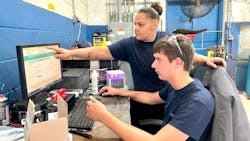My name is Beret DeWeese, and I have dedicated the past 15 years of my life to the automotive industry. My journey began as a teenager with the simple need for a job. I walked into Advance Auto Parts knowing nothing about cars, but I was willing to learn, and that made all the difference. Since I got my start in aftermarket retail I have worked as a shop manager, a training shop advisor, and I am currently working as a technician and trainer at Wynne Ford in Hampton, Virginia.
As an auto technician who has seen many sides of this industry, I want to share where employers get it right and where they make errors in recruiting and retaining their techs.
Motor Age is partnering with TechForce Foundation to highlight young automotive technicians in the early days of their careers. This first-person account provides a technician's view on entering and staying in the industry.
Why Your Technician Shortage Might be Worse Than Your Neighbor’s
It is no secret that automotive is facing an industry-wide technician shortage. Still, you might be making the problem worse for your shop than it needs to be. Here are three ways you may be making it harder to recruit new talent and retain the technicians on your team.
First, by making your technicians work harder for less. As technology has improved some jobs have gotten easier. Unfortunately, that means the billable hours for many jobs have decreased. Where brakes may have been two hours of tech time a decade ago, it may be one and a half or even one and a quarter hours today. That means technicians need to do 30-60% more jobs just to receive the same pay as 10 years ago.
Second, shops need to help their technicians stay ahead of evolving technology. Learning new tech can be hard. Experienced technicians can struggle with new diagnostic procedures, and many in the younger generations shy away from learning the complex electrical and computer skills new cars demand. If your technicians are not learning advanced diagnostics, electrical systems, and hybrid vehicles today, your operation risks becoming irrelevant in just a few years. Smart technicians know this, and they will leave you for an employer that prioritizes growing their skills.
On the flip side is the third issue: relying too much on training. Employers who hire anyone to work in the shop, regardless of their skill level, risk alienating their existing technicians. It’s one thing to start someone in an apprenticeship or a low-level position where they will gain skills without disrupting their colleagues. It’s another thing entirely to put an inexperienced technician in the shop and expect your experienced techs to pick up their slack. Building your future workforce takes time, but it is imperative for success.
Building Your Next Generation of Technicians
How does someone become a technician? Do they just wake up one day with the skills? No. Do they wake up one day and decide to get training? No. First, they need to be inspired to become a technician. That’s why organizations like TechForce Foundation and private-to-nonprofit partnerships are so important.
Thanks to a partnership between Wynne Ford and the local nonprofit Community Knights, I have had the privilege of training high school students who are autistic one-on-one in our shop for the past year. This experience has been incredibly rewarding. I have seen firsthand the unique strengths these students bring to the table. Many possess an exceptional aptitude for diagnostic skills and, through our program, have also developed their soft skills to the level we look for in new technicians.
All participants graduate from the program with the skills needed to be quick lube technicians. We have already hired one to work in our shop and look forward to continuing to serve the community while expanding our talent pool.
Where Trainers Can Step Up to Help
Training and education are the cornerstones of our industry’s future. Expanding the options available to students would go a long way in improving their experience once they become technicians.
There needs to be a stronger push for formal education in automotive technology. We should advocate for specialized bachelor’s degrees that focus on automotive theory, allowing students to hone in on the critical skills they need without the added burden of unrelated engineering components.
We also need to cultivate stronger soft skills across the board. I’m seeing that young people have less and less communication and people skills as time goes on. Fortunately, we can teach these skills. That is why comprehensive training is so important. Technical education cannot focus solely on developing technical skills anymore. Educators need to train students to deal with customers, managers, and their colleagues in the shop.
Retention Matters as Much as Recruitment
For all the effort a shop puts into recruiting new technicians, they should put just as much resources into retaining the technicians they have.
At the end of the day there are three things every technician looks for in an employer, and a fourth that can be the deciding factor in whether a technician stays with your shop or finds a new place to work:
- Pay and Compensation: This one about explains itself. If your techs can make significantly more somewhere else, they will.
- Shop Equipment: Does your shop provide the resources and tools your technicians need to get the job done? Or do you expect them to foot the bill to bring their own equipment to work? In a competitive marketplace, this can be the difference between a technician staying where they are and changing jobs.
- Training Opportunities: As stated earlier, technicians need to keep pace with evolving technology to stay relevant. Is your shop providing technicians opportunities to develop these skills?
- Relationships and Communication: The relationship between technicians, service managers, and customers is delicate but crucial. When business is good, a fast-paced environment is to be expected. However, if management pursues customer satisfaction by setting unrealistic expectations of technicians, they may face a retention problem in the future. A supportive work environment is essential to retaining skilled technicians.
As someone who has seen several sides of this industry, I am confident we can address the challenges facing us head-on. By investing in training, supporting our technicians, and partnering with workforce development organizations to inspire interest in automotive careers, we can ensure the automotive industry remains strong and vibrant.
Profile provided by TechForce Foundation.



